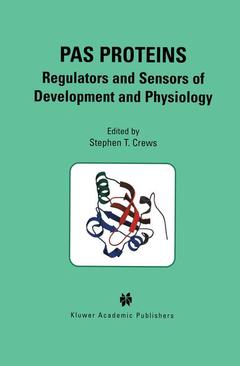Description
PAS Proteins: Regulators and Sensors of Development and Physiology, 2003
Language: English
Subjects for PAS Proteins: Regulators and Sensors of Development and...:
Keywords
Evolution; biochemistry; genes; metabolism; proteins; signal transduction; transcription
Publication date: 10-2012
263 p. · 15.5x23.5 cm · Paperback
Publication date: 09-2003
263 p. · 15.5x23.5 cm · Hardback
Description
/li>Contents
/li>
PAS proteins control numerous physiological and developmental events, and span phylogeny from bacteria to man. Bacterial and plant PAS proteins act as sensors of environmental stimuli, including light, oxygen, and energy status.
Not surprising, given these roles, there is intense investigation of the roles of bHLH-PAS proteins in issues of human health including: (1) cancer induction, (2) cancer growth and vascularity, (3) birth defects, including Down syndrome, (4) appetite control and obesity, (5) sleep rhythm disorders, and (6) mental health disorders such as social interactions and learning.
PAS proteins encompass many fields of biology, and scientists who work in these fields (circadian rhythms, oxygen regulation, toxin metabolism, bacterial sensors, and development) are an audience, particularly those who actively work on PAS proteins and researchers interested in transcriptional control, signal transduction, and evolution.




